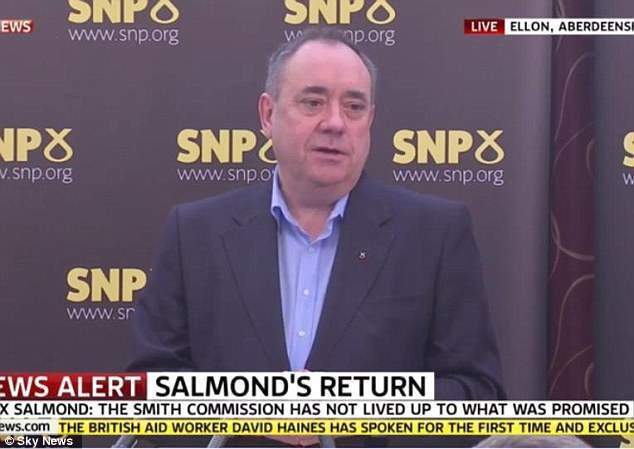
There are few greater pejoratives in the Scottish nationalist lexicon than “Westminster”. But that is where Alex Samond is planning to spend the next stage of his career. As Caroline reported last night, the former SNP leader will stand in the Lib Dem-held seat of Gordon in next year’s UK general election.
It might seem odd for Salmond to leave Holyrood just as it acquires greater powers, but the move makes sense on several levels. With Nicola Sturgeon taking over as SNP leader and First Minister, he would risk becoming a backseat driver if he stayed any longer. His party’s surge in the polls also means that he stands to form part of a far larger Scottish nationalist group next year (he insists that Angus Robertson will continue to lead the bloc). In Gordon, he has chosen a winnable constituency (the SNP finished second last time) on his home turf of Aberdeenshire. The Lib Dems’ collapse in Scotland and Malcolm Bruce’s decision to stand down (limiting any incumbency bonus) means that he has been immediately installed as the favourite. (A source notes that he was considering standing in Glasgow or the central belt and appears to have ducked a tougher fight with Labour.)
By arguing (albeit disingenuously) that the Westminster parties haven’t kept their promises on further devolution, the SNP has what it previously lacked: a compelling reason for Scottish voters to support it in a UK general election. In his speech announcing his candidacy this morning, Salmond declared: “Firstly, the Smith Commission has not measured up to what was promised. It is not proposing ‘home rule’, ‘devo max’ and still less ‘near federalism’. It is real control of one more tax and a small proportion of welfare spending; it would leave Scotland still in the clutches of Westminster austerity. That is not Robert Smith’s fault. It rather reflects the reality that the Westminster parties will concede to Scotland as little as they can get away with. It is up to us to ensure that they get away with nothing.”
The prospect of another hung parliament is the other factor that has lured him to Westminster. By winning as many as 40 MPs (it currently holds just six), the SNP could conceivably hold the balance of power. Salmond said this morning: “No overall majority seems the most likely outcome of the Westminster elections and therefore the opportunity exists for Scotland to emerge from next year’s election in a commanding position.”
Last month, in her first speech as SNP leader, Nicola Sturgeon outlined what the party’s negotiating demands would be: “real powers” for the Scottish parliament, a rethink of “endless austerity” and, most significantly, the removal of Trident from Faslane.
Given their toxic status, Sturgeon, unsurprisingly, has already ruled out any deal with the Conservatives. But she has left the door open to a partnership with Labour (almost certainly in the form of a confidence and supply arrangement, rather than a coalition).
Yet that stance creates some awkward questions for the nationalists. By signalling their willingness to work with Labour but not the Tories, they are tacitly conceding that a government led by the former is superior to one led by the latter. Why, then, they will be asked, are you working to prevent a Labour victory? The SNP usually responds by pointing out that Scotland accounts for just 59 of Westminster’s 650 seats, leaving it with little influence over the outcome. But in an election as close as this one, a large swing against Labour in Scotland could gift David Cameron another term in Downing Street. Reconciling the contradiction between that and the party’s stance on a hung parliament will be one of Salmond’s greatest tasks.




